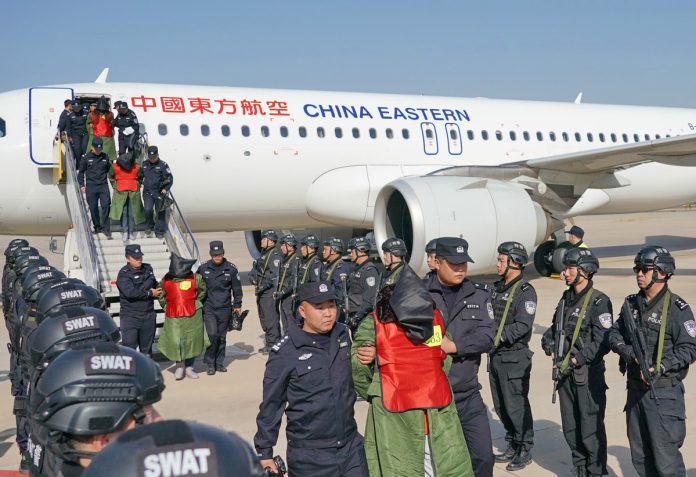A recent report by the United States Institute of Peace (USIP) highlights the alarming rise of industrial-scale gambling operations in Southeast Asia, identifying them as a significant driver of transnational crime and regional instability.
Established by the US Congress in 1984, the USIP acts as an independent institution devoted to the ‘nonviolent prevention and mitigation of deadly conflict abroad’.
The report, compiled by a senior study group of experts, examines the complex web of criminal networks that exploit weak governance and law enforcement to thrive in countries such as Myanmar, Cambodia, and Laos.
‘Over the past decade, Southeast Asia has become a major breeding ground for transnational criminal networks emanating predominantly from China. These organizations target millions of victims around the world with illegal and unregulated online gambling and sophisticated scamming operations,’ the report points out.
‘As of the end of 2023, a conservative estimate of the annual value of funds stolen worldwide by these syndicates approached $64 billion.’
The USIP report details how criminal organizations have established large-scale scam compounds that heavily rely on forced labor to run online gambling and scam operations. These illicit activities have not only spread across Southeast Asia but are also targeting victims globally, posing a direct threat to human security and the national security interests of several countries, including the United States.
According to the UTIP, scamming operations proliferating in the region nowadays have their roots in a regional network of loosely regulated casinos and online gambling that, beginning in the 1990s and accelerating in the 2000s, some governments promoted as a legitimate contribution to economic development.
‘Chinese nationals were the main target of the overseas gambling business due to a complete ban on gambling in China, where the annual market for gaming is estimated at $40 billion to $80 billion,’ it adds.
‘A range of forces have led this malign activity to take on new characteristics and, propelled by advances in digital technology, to reach beyond the region to target a global audience.’
These forces include the impact of the COVID-19 pandemic; expanding pockets of lax government regulation and law enforcement in the region; the spread of conflict in Myanmar; and the co-option of the state apparatus by gambling-related criminal interests in various countries, Cambodia and Laos in particular.
Philippines, Myanmar and China

The study also addressed the role of the Philippines in the proliferation of online gambling. During President Rodrigo Duterte’s administration, a centralized framework for Philippine Offshore Gaming Operators (POGOs) was established, leading to a surge in licensed online gambling establishments.
‘This regulatory framework allowed these operators to bypass traditional taxation and financial disclosure requirements, fostering an environment where criminal activities could flourish,’ the report argues.
As for Myanmar, scam compounds receive additional protection from military and border guard forces, becoming integral to the country’s internal conflict.
These compounds have been implicated in the ongoing rebellion against the military junta, with various ethnic organizations attacking scam centers to wrest control from military-affiliated forces. Similarly, in Karen State, the scam compounds are caught in the crossfire between anti-junta forces and military-supported militias.
The profitability of these operations is staggering. In Cambodia alone, cyber scamming generates an estimated $12.5 billion annually, nearly half of the country’s formal GDP.
Overall, the criminal syndicates in the Mekong region are believed to steal over $43.8 billion each year, a significant portion of which flows to military and political elites in Myanmar, Cambodia, and Laos.
These funds are laundered through complex operations that penetrate the formal economy, including real estate investments in major financial hubs worldwide.
China‘s relationship with these criminal networks was also described as ‘complex’, marked by a mix of enforcement and complicity. While Beijing has cracked down on certain elements of these networks, it also leverages their activities to further its geopolitical aims, particularly through initiatives like the Belt and Road Initiative, claims the USIP.
‘Corruption within China further complicates these efforts, with many officials turning a blind eye to the criminal activities in exchange for bribes,’ the report adds.
US reaction

For the USIP, the United States has emerged as a major target of these scams, with Americans losing billions annually, with US residents losing an estimated $3.5 billion to these criminal operations.
‘The US Department of Justice has indicted individuals for laundering scam profits, highlighting the presence of these networks on American soil. This growing threat could soon rival the dangers posed by fentanyl trafficking, underscoring the urgent need for a coordinated international response,’ it pointed out.
The USIP also underscores the severe human costs associated with these gambling operations, citing instances of human trafficking and forced labor within POGO locations, where trafficked individuals are coerced into participating in scam operations under threat of violence.
‘These conditions have persisted despite efforts by the current Philippine government to crack down on scam syndicates and reduce the number of licensed operators,’ it alleges.
‘The criminal networks behind these operations have shown a remarkable ability to adapt to regional conditions and evade law enforcement efforts. Their activities are not confined to the illicit sphere; they often intersect with legitimate business sectors, gaining influence over local government and business elites’.
For the body, this duality makes them particularly difficult to combat and allows them to maintain a step ahead of regulatory and law enforcement agencies.
The USIP report concluded by calling for strengthened international cooperation to dismantle these criminal networks, with recommendations include enhancing regional law enforcement capabilities, improving regulatory frameworks, and disrupting the financial flows that sustain these illicit activities.












